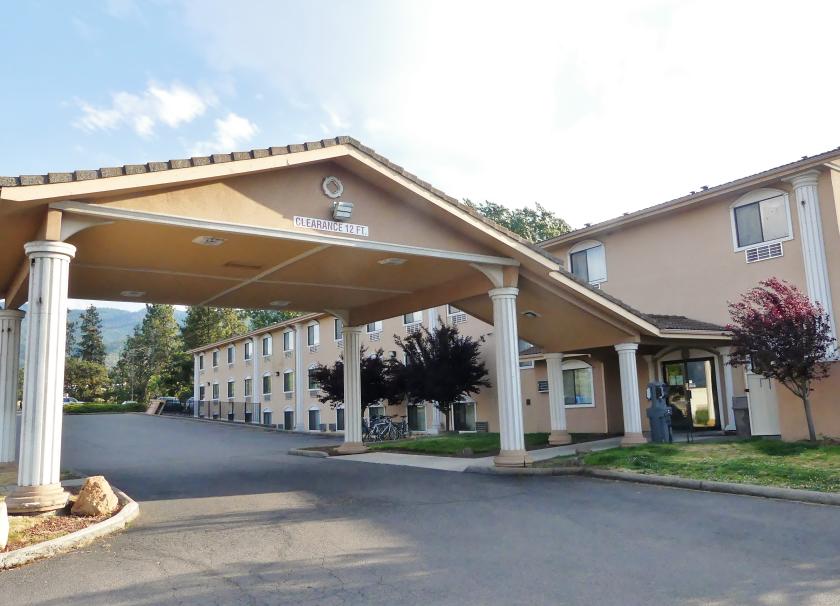
February's Change for Good partner: OHRA

OHRA helps low-income people build better lives through access to social service resources. By helping
people move from crisis to stability, OHRA builds more capable individuals, stronger families, and a
better community. We have three core programs:
OHRA Community Resource Center (OCRC) is the only walk-in resource center serving Jackson
County, offering these basic services:
- Housing Match helps unhoused people find housing and resources to become stable and housing threatened people to stay housed by providing short-term rent or utilities assistance and other resources.
- Job Match gives job search assistance to help people find employment.
- Essential Services are resources that enable guests to overcome barriers to moving forward, including but not limited to assistance to purchase critical items such as a birth certificate or Oregon ID; help applying for benefits and navigating systems including e.g. OHP or Social Security; and, access to internet, telephone and U.S. mail.
.jpg)
The OHRA Emergency Shelter (OES) is a year-round, non-congregate facility providing emergency
housing and meals to vulnerable unhoused people for up to 6-months. During their stay, guests have
access to support navigation services where trauma-informed staff work alongside guests to help them
develop a housing plan, gain employment, or access services to support long-term health and well-being.
The OHRA Laundry and Shower Trailer (OLST) where unhoused people can access basic hygiene
services.
OHRA’s staff of Resource Navigators are the heart of every program offered at the Center, placing the
guest at the center of our service, and working alongside them with a trauma-informed approach. By
building relationships rooted in trust, OHRA Resource Navigators help identify and meet the most
pressing needs of guests. Our goal is to be a “one-stop shop” where a guest can find everything they need to move from crisis to stability.
OHRA stayed open continuously during the pandemic and, after evacuating on September 8, reopened the
next day to serve people devastated by the Almeda Fire. When people have nowhere else to turn to,
OHRA is there as a lifeline for the people in our community who need us most. We certainly focus on our
unhoused guests, but we are also the only resource in town who helps people who are on the verge of
homelessness stay housed and avoid eviction. OHRA has the only walk in resource center in Jackson
County.
We pride ourselves on having a diverse staff, board of directors, and advisory council. At every level of
OHRA leadership people of color, LGBTQ+, indigenous people, and people with lived experience of
poverty and homelessness are represented. We are also proud to be part of a network of community
partners serving our area seeking to improve the lives of those we serve.
Guest Stories with OHRA
Sheila's Story
“If it hadn’t been for OHRA, I would still be living on the street. But because of OHRA, I had a bed, a
room, a foundation,” says Sheila Chaney, a former Shelter guest. That foundation, combined with
Sheila’s own motivation and determination, enabled her to find the tools to build a better life. As a result,
Sheila now has her own permanent home after five years of homelessness.
“When you are on the street you just live minute to minute,” Sheila explains. The Shelter, she says,
changed that. “OHRA gave me a home, so I wasn’t on the street freezing and getting frost bite.” Instead,
she could focus on improving her life.
Chaney, a former OHRA shelter guest, now has her own apartment. She is nearly giddy when she talks
about it and quickly credits the OHRA Shelter, the OHRA resource navigator, her church, Jackson
County Housing Authority, United Way, and St. Vincent de Paul for her new home. But clearly, the
deciding factor in her ability to build a new life was her own determination.
Sheila says her life went off the rails in 2018 due to a domestic tragedy that resulted in her losing custody
of her two youngest children as well as her home. She was living on the street in California when she
first sought help with drug addiction and began her journey to sobriety. Things appeared to be improving
when a childhood friend in Ashland suggested she move in with her. For reasons Sheila does not
understand, her friend assaulted her, and she ended up on the street again.
“I had no family. No friends. No support system.” But despite her situation, Sheila remained determined
to remain drug-free. “I was proud of being in control of my own sobriety.” She was working with On
Track, a Medford-based drug treatment center, to stay clear of drugs, and they told her about OHRA.
She applied and moved into the OHRA Center Shelter.
Once she was in the OHRA shelter, Sheila says, “I hit the ground running. I did not have a car, so I had
to walk everywhere and one day I saw a sign for an apartment for rent.” Sheila applied instantly before
she even had a HUD appointment or voucher because she knew apartments were scarce. She thought her
income would cover the rent. But to be sure, she also applied for an Emergency Housing Voucher, which
she eventually received.
Every day she called the rental agent and owner about the apartment. When the first person in line failed
to claim the apartment, Sheila moved to the front of the line. But the rental deposit presented a huge
obstacle. Sheila contacted her church about potential resources and to her delight they gave her enough to
cover the deposit and some rent.
Sheila glows when she talks about her new home.
“I have a new life now. I have a beautiful home,” she says gleefully. “OHRA gave me hope. My church
gave me faith. It’s incredible.”
“My Coach, My Teammate, My Umpire”
OHRA meticulously tracks and counts the services it provides. But sometimes it is hard to quantify what
may be the most vital service – being a companion on a guest’s road to recovery.
Susan (not her real name) is a guest whose story and note of appreciation to OHRA stressed the value of
having someone to lean on when you hit a rough patch.
Susan originally came to OHRA nearly two years ago. She had been working with an OHRA partner, St.
Vincent de Paul, on the problem of stable housing, but then Susan’s car broke down and she lost both
transportation and a potential (although not ideal) shelter. Lead Navigator Tina Stevens worked with
Susan and, with other OHRA partners, raised money for car repairs. However, that did not end the
problem of her unsafe housing (coach surfing and even sheltering in a former shop). Eventually, Susan
moved into the OHRA Center as a stop gap. Tina worked with her to get a HUD and then the housing
authority found a landlord who would take the voucher. Here is part of Susan’s note to OHRA, United
Way and St. Vincent de Paul.
“This has been a very long journey. But I wasn’t alone on my path. I had you, Tina. You had my back
through every single step. I don’t know what I would have done without you rooting me on, being my
coach, my teammate and my umpire.”
Susan talked about moving out of her OHRA Center room for its next guest. “This was a wonderful place
to be. You are all amazing people.”
A Couple's Story: Rapid Rehousing Stops Crisis from Snowballing
John and Judy's situation was bleak-- they were living in a motel for two months after losing their jobs
and home. Room costs were eating up their savings. John’s chronic disability made sleeping in the car
impossible. OHRA’s navigator quickly recognized the couple qualified for COVID Rapid Relief
Rehousing funds. OHRA’s navigator found them an apartment just nine days after meeting them.
When OHRA’s navigator told them “I can get you housed right now,” Judy fell to her knees and cried.
Since then, John has secured disability benefits. Judy continues to look for work, but in her words “a
world of worry has been lifted.”
A Family's Story: Hope When Everything Was Lost
A family of agricultural workers came into the Resource Center because COVID had taken their jobs, and
the Almeda fire had taken their home. OHRA’s navigator immediately contacted a community partner
that found a rental for the family. OHRA connected the family with resources for a deposit and several
months’ rent. In a follow-up visit OHRA was also able to secure utility assistance while they got on their
feet.
The parents are now employed and deeply grateful for the help during an unthinkable crisis. With his
parents stable, the oldest son was able to stay in school and graduate from college.
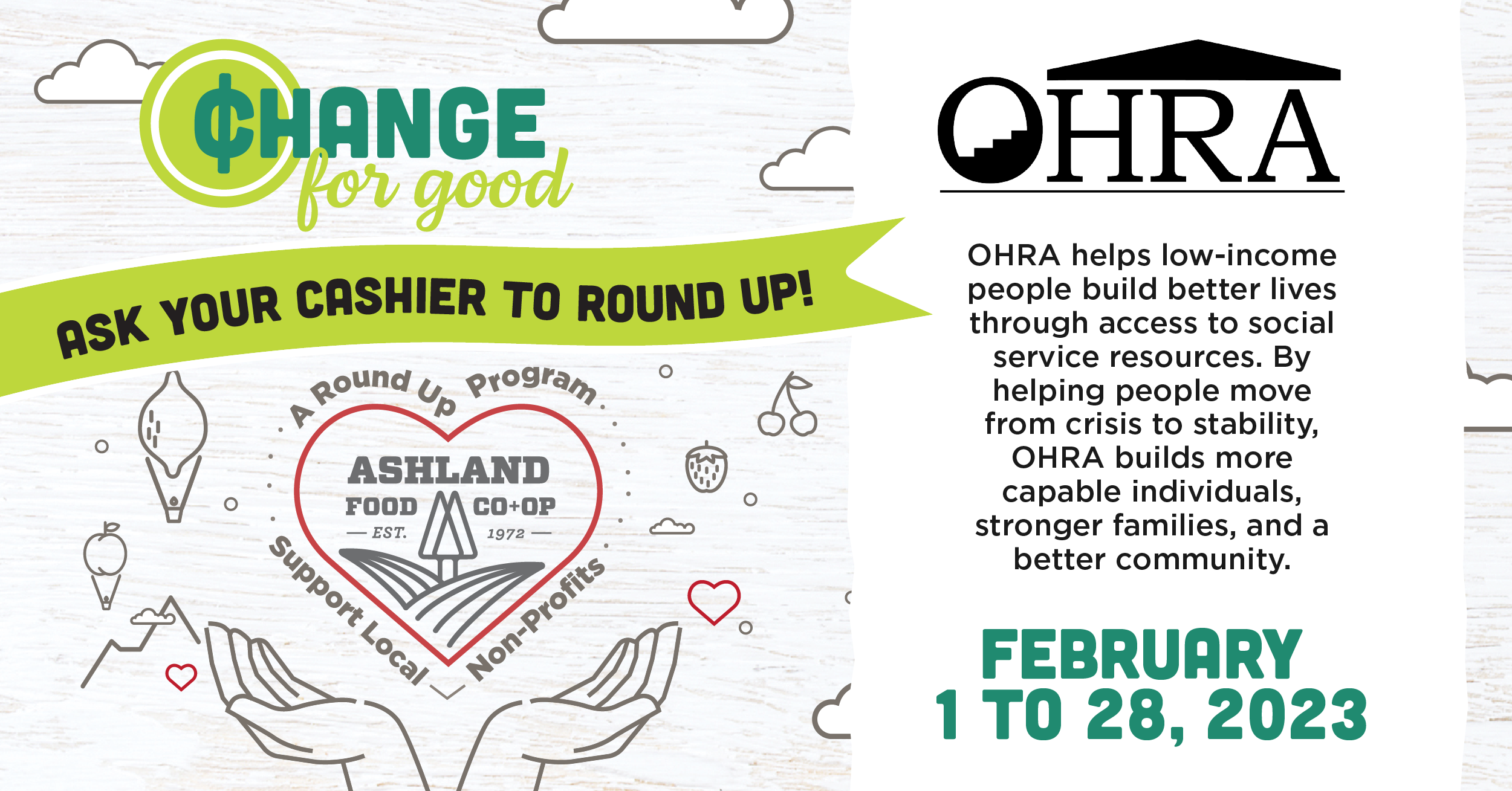
More Co-op News
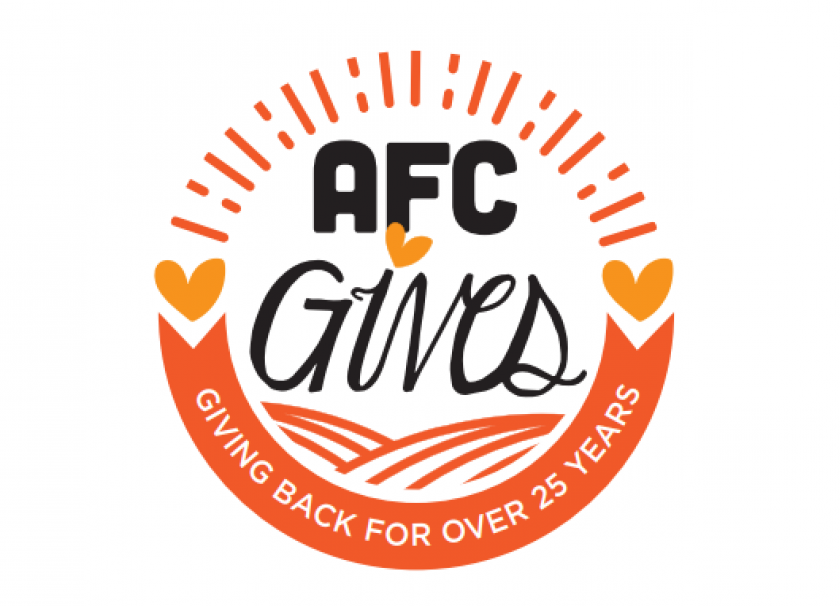
Apply for an AFC Gives community grant
For over 25 years, the Ashland Food Co-op has been re-investing in the local community by awarding grants to non-profit organizations doing important work in the Rogue Valley. Putting the seventh cooperative principle, "concern for community," into action, over $30,000 was donated in 2019 - and in 2020, there are even more opportunities for non-profits.
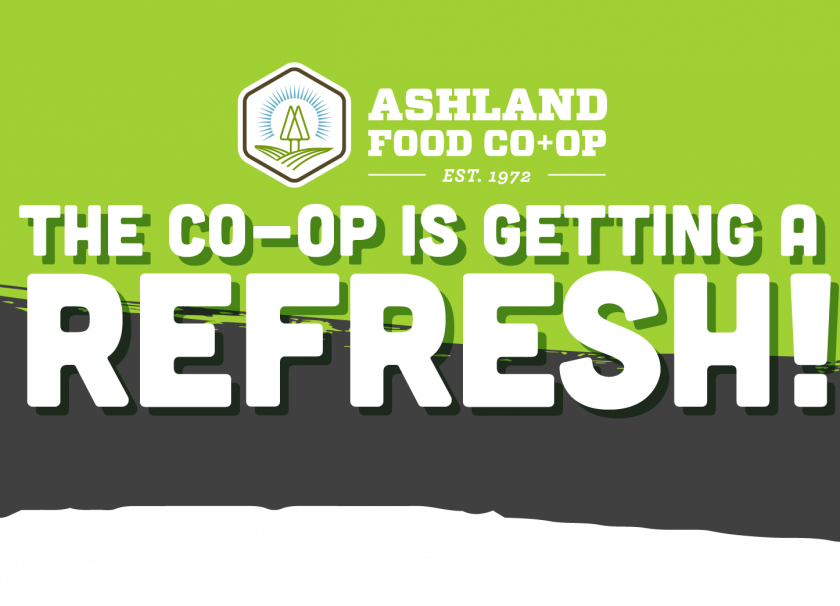
The Co-op is getting a refresh
We are giving our store a much-needed fresh coat of paint. We think you'll enjoy the changes!
When
The painting team will begin our project on February 5th, 2020 with a start time of 9pm.
Where
The entire retail store, deli serving area and interior seating area will receive a fresh new coat of paint.
Timeline
If all goes as planned, our painting project should be finished by February 20.
Will Store Hours Change?
No. We will be painting from 9pm to 5am.
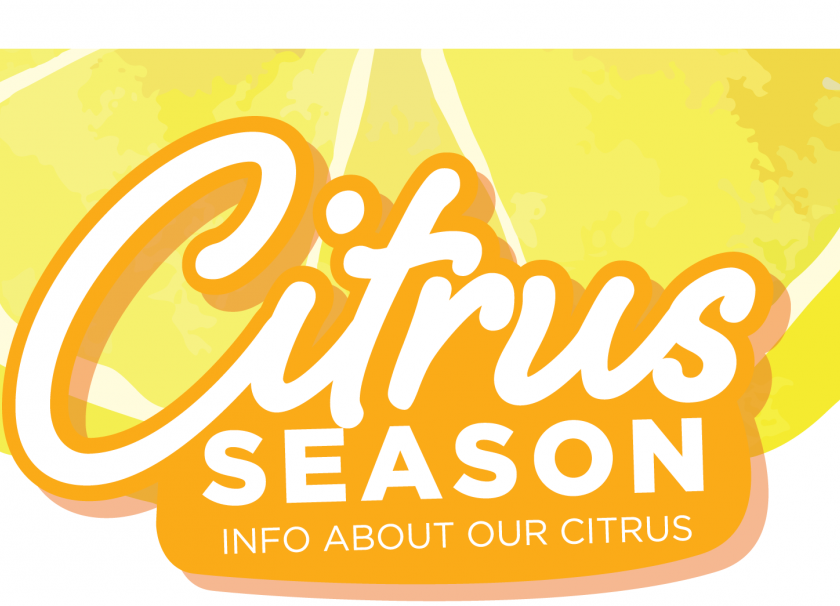
Explore citrus!
Looking to explore some new citrus varieties? Know more before you go! Check out the many types of sweet, sour and somewhere in between that you can enjoy at the Co-op! (Availability may vary due to seasonality.)
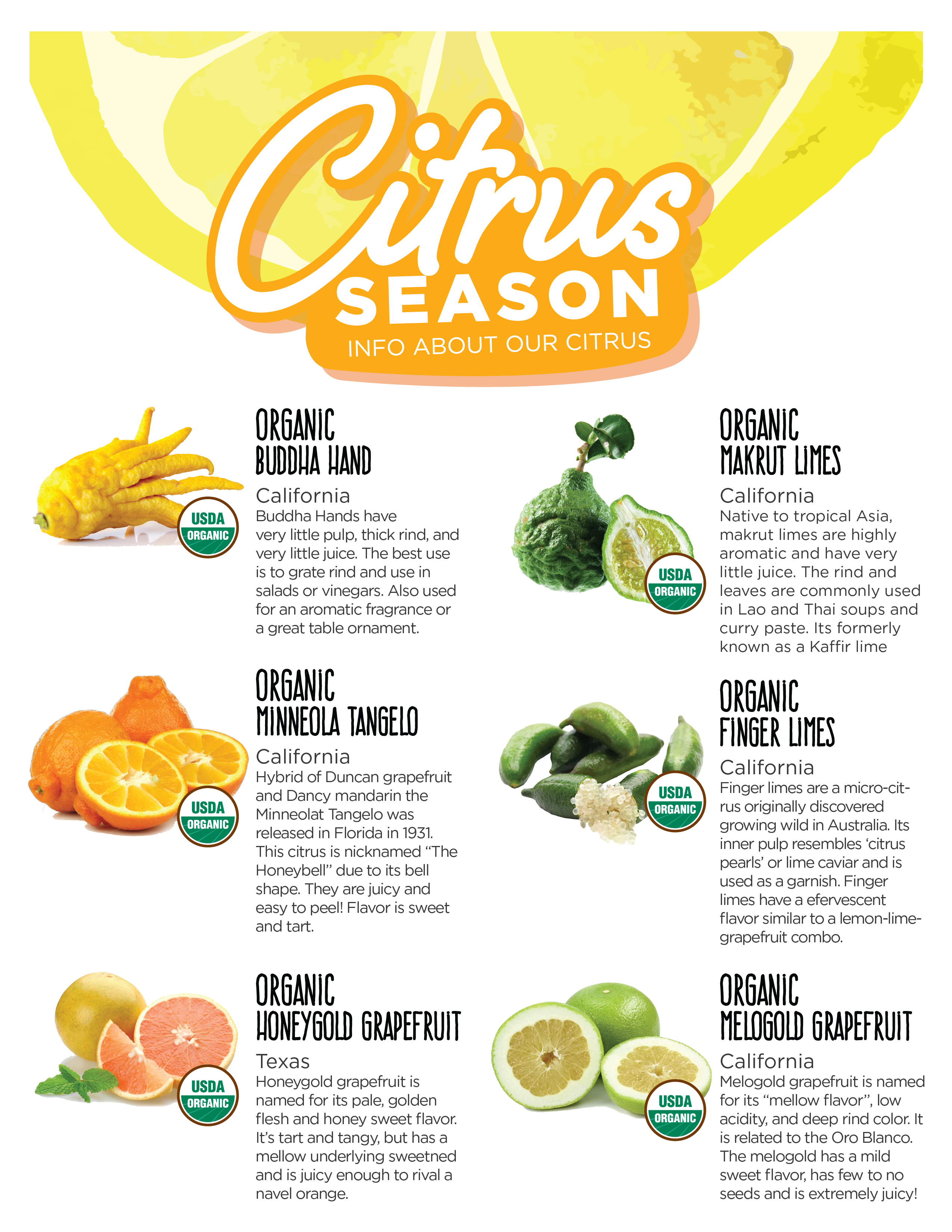
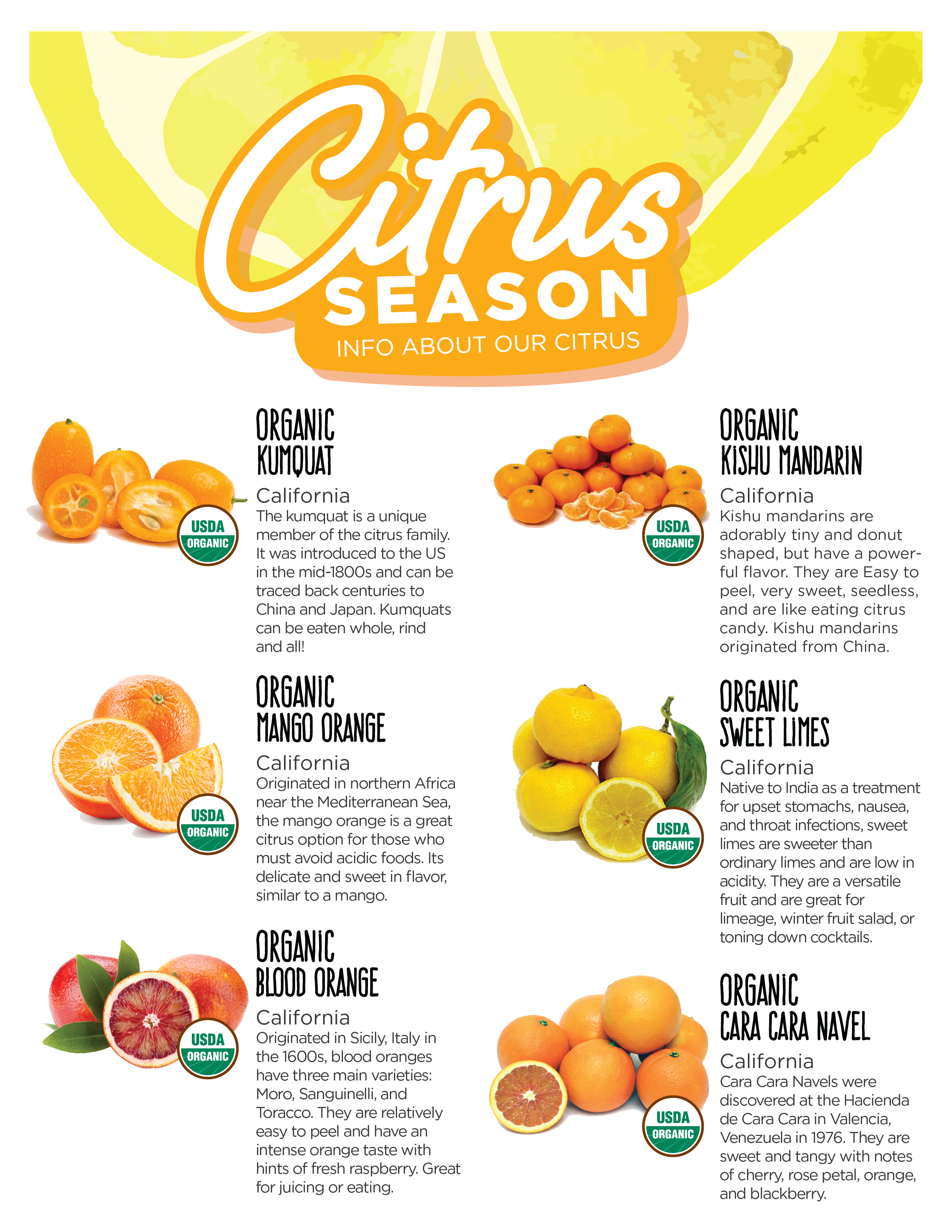

Taste for Life winter wellness giveaway
It's a month of giveaways from Taste for Life!
Giveaway #1 has finished up - so it's time for #2! This giveaway runs 1/27-2/2, so sign up below.
This package includes: NOW's Sabucus Zinc-C lozenges, Mushroom Wisdom's SX-Fraction, Bluebonnet's Stress Release formula, ChildLife's First Defense immune formula, Vitafusion's Organic Women's Multi vitamin, Quantum Health's Eye Health supplement, Kyo-Green Sprouts Blend digestion supplement, Solgar's full spectrum Curcumin supplement, and Solgar's No. 7 joint comfort supplement.

Rogue Co-ops College Scholarship
As part of the Rogue Co-ops, a group of Rogue Valley cooperative businesses that includes Ashland Food Co-op, Grange Co-op, Medford Food Co-op, and Rogue Credit Union, we're excited to offer a scholarship opportunity to local high school students planning on attending college.
The Rogue Co-ops have collectively funded a $2,000 scholarship (and Grange Co-op offers an additional eight $1,500 scholarships) for students (in public, private or home school settings) who meet the following requirements:
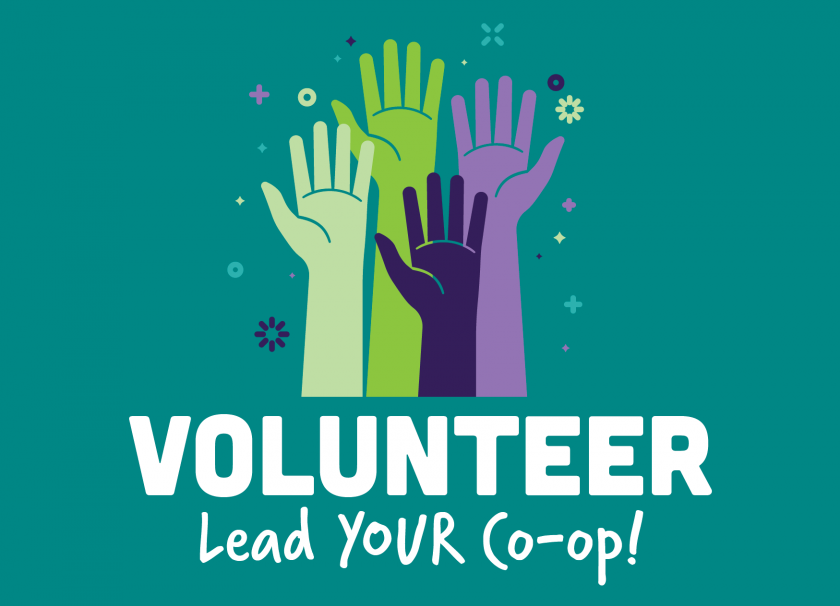
Become an Owner-Volunteer with the AFC Board
The AFC Board of Directors is looking for owner-volunteers for three board committees: the Owner Engagement Committee (OEC), Board Development Committee (BDC), and AFC Gives Committee.
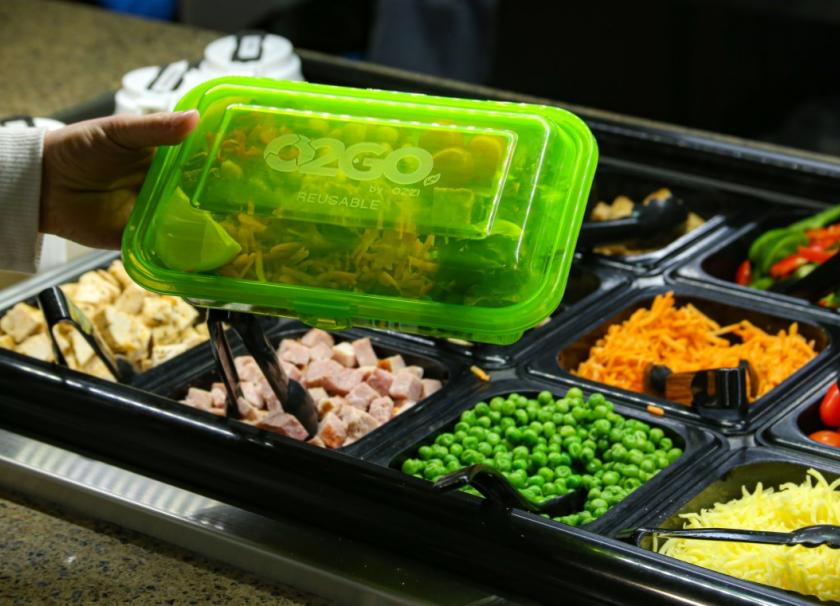
Sustainability Update: Building on a Strong Foundation
Sustainability Update
Our team has been working on many different projects throughout the year, taking great steps to fulfill our four sustainability goals. Our four goals to achieve by 2030 are: carbon neutrality, zero waste, eliminating toxic chemicals, and being a leader in our sustainable community. We look forward to our sustainable success in the upcoming decade!
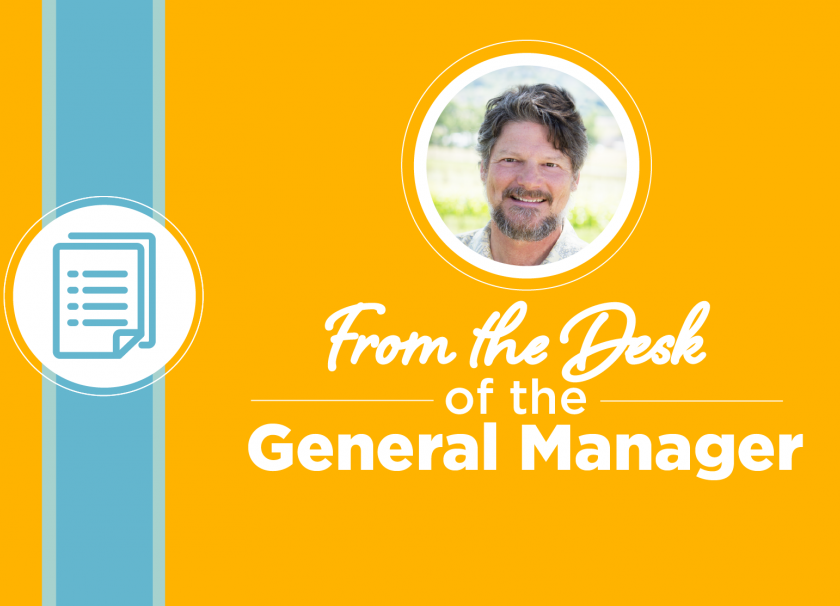
2020: A vision for the future through Co-ops and local food
As the 2010s come to a close, the “20/20” eyesight analogy couldn’t be more appropriate for the new decade. With our eye on the future, there’s clearly a sense of urgency and awareness of the unique times we’re living in: a changing climate, increases in costs of living, and the shared pressures of a globalized world.

5 Items to Try: Spreads, Condiments & Snacks
It's fun trying new things! Here are five items you can find at the Co-op with a distinctly international flavor. Whether you're spreading them on some bread or naan, mixing up a salad dressing, or just want something salty and crunchy to snack on, try these out next time you want to elevate your dishes.

10 Ways to Enjoy: Ginger Spread
Sometimes you might come across a product at the Co-op and ask, "That looks good, but how in the heck can I use it in my cooking?" To answer that question, we picked this Ginger Spread made by The Ginger People (famous for their Gin-Gin candies). Grab a jar and try some of these unique applications in your own kitchen - or get inspired to utilize it in another way.
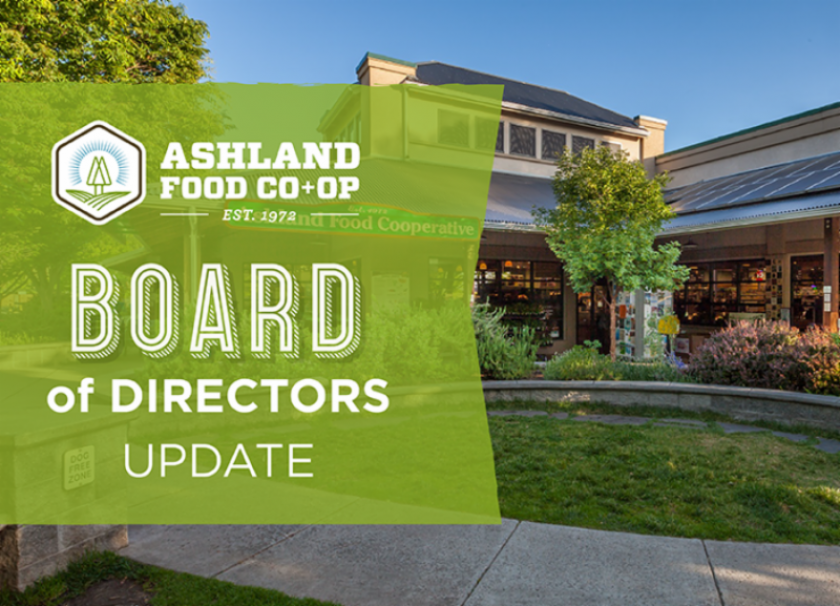
Meet Your Board: Melina Barker
Hello, Co-op members! My name is Melina Barker, and I joined the AFC Board of Directors this July. Since then, I have been busy learning about all the work the previous members have done to craft strategic goals to support the success of the AFC.
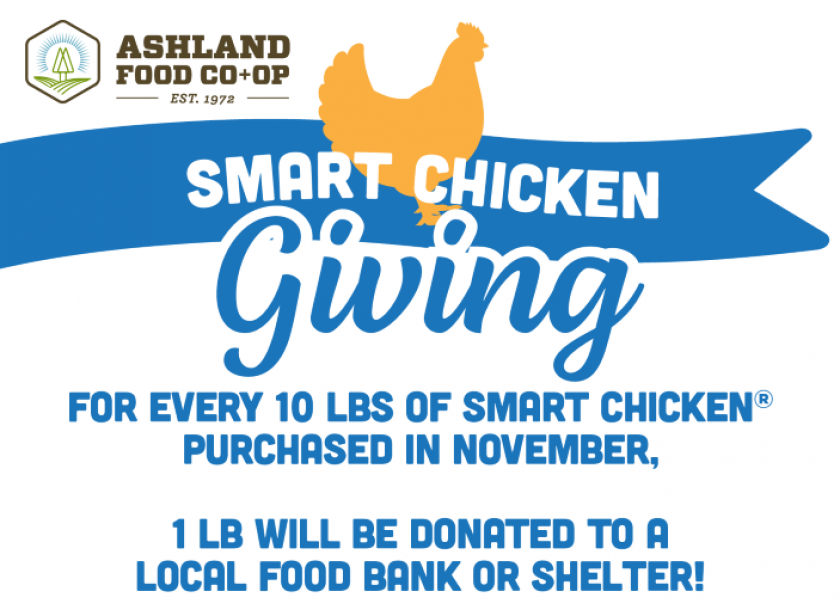
Smart Chicken® Holiday Giving in 2019
During the month of November, Co-op shoppers can nourish their own families and help fight hunger in the Rogue Valley.
Over the years, Smart Chicken® and Ashland Food Co-op have teamed up to donate thousands of pounds of chicken to ACCESS. Smart Chicken® will once again donate Smart Chicken® products based on the total volume that shoppers purchase at Ashland Food Co-op to ACCESS.
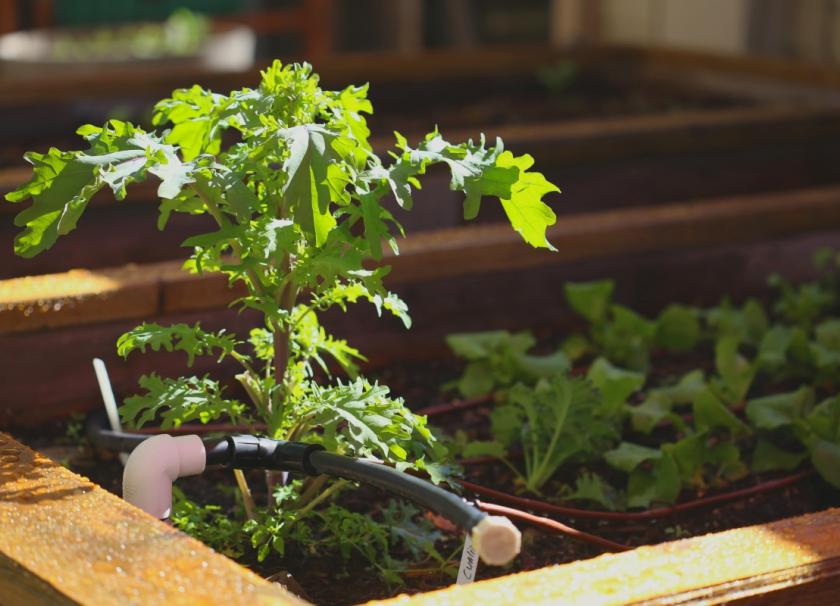
Henry in the Garden: Already Preparing for the Spring
The bane of all gardeners is powdery mildew - that white substance that collects both on the tops and bottoms of the leaves of your healthiest vegetable plants. Cucumbers and zucchini seem to be more easily affected by this scourge than many others.

GM Report: Gratitude for a Great 2019 at the Co-op
It’s the season of gratitude and reflection on the year that has passed, and there is so much to be thankful for as a Co-op owner.
2019 started off with the news that over $13,000 in emergency donations had been raised from Co-op owners and shoppers for support and relief efforts after Paradise, CA was leveled by a wildfire. This outpouring of our support was critical in the months after the fire, after the news trucks had left and the work of rebuilding began. I know how grateful we all are for the much calmer smoke season that our region experienced this summer.
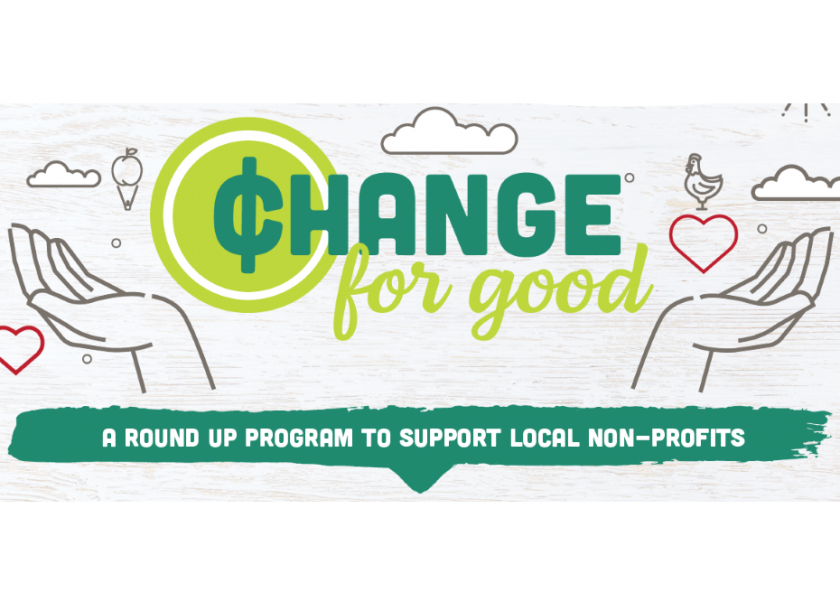
Rounding Up in October
Part of what makes co-ops unique are the guiding 7 Principles of Cooperation. One of the seven that is felt strongly in Ashland is "Concern for the community" - and that's why the Co-op is offering a new way to give back to our community for the month of October. When you pay at the register, you can round up your total to the nearest dollar. For example, $11.68 becomes $12, and $0.32 is donated.
